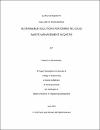Sustainable solutions for domestic solid waste management in Qatar
الملخص
Due to the fact that Qatar has increased its investments and projects worldwide, Qatar has become one of the world’s fastest growing economy and highest paid GDP. As a result, the population has increased in the last few years. This increase in population is associated with an increase in generated waste and accumulation of waste. Waste generation and accumulation is associated with hazards and is harmful to people and the environment. In line with Qatar National Vision 2030, it is important for Qatar to design and develop sustainable solutions for waste management. One of the major waste streams in Qatar is Domestic Solid Waste (DSW). This is waste produced by citizens at their homes. The current practice of domestic waste management in Qatar focuses on collecting all types of wastes from homes and sending the collected waste to landfills. This practice is associated with health and environmental problems, and therefore is not sustainable. In this project, new initiatives, directions and opportunities for sustainable domestic solid waste management and practices were investigated. Prospects for waste collection and waste recycling management system were discussed based on the fundamental principles of location allocation. A two tier sustainable waste management system in which waste from residential areas will be collected and transported to Waste Transfer Stations, sorted at these stations and then transported to dedicated Waste Recycling Plants was proposed. The feasible number and locations of Waste Transfer Stations and Waste Recycling Plants were determined through GIS modeling and simulation. Obtained results show that Qatar needs seven Waste Transfer Stations and three dedicated recycling plants (for paper,plastic and metals) in order to deal with the issues of waste generation and waste accumulation in a sustainable manner.
DOI/handle
http://hdl.handle.net/10576/5383المجموعات
- الإدارة الهندسية [147 items ]


